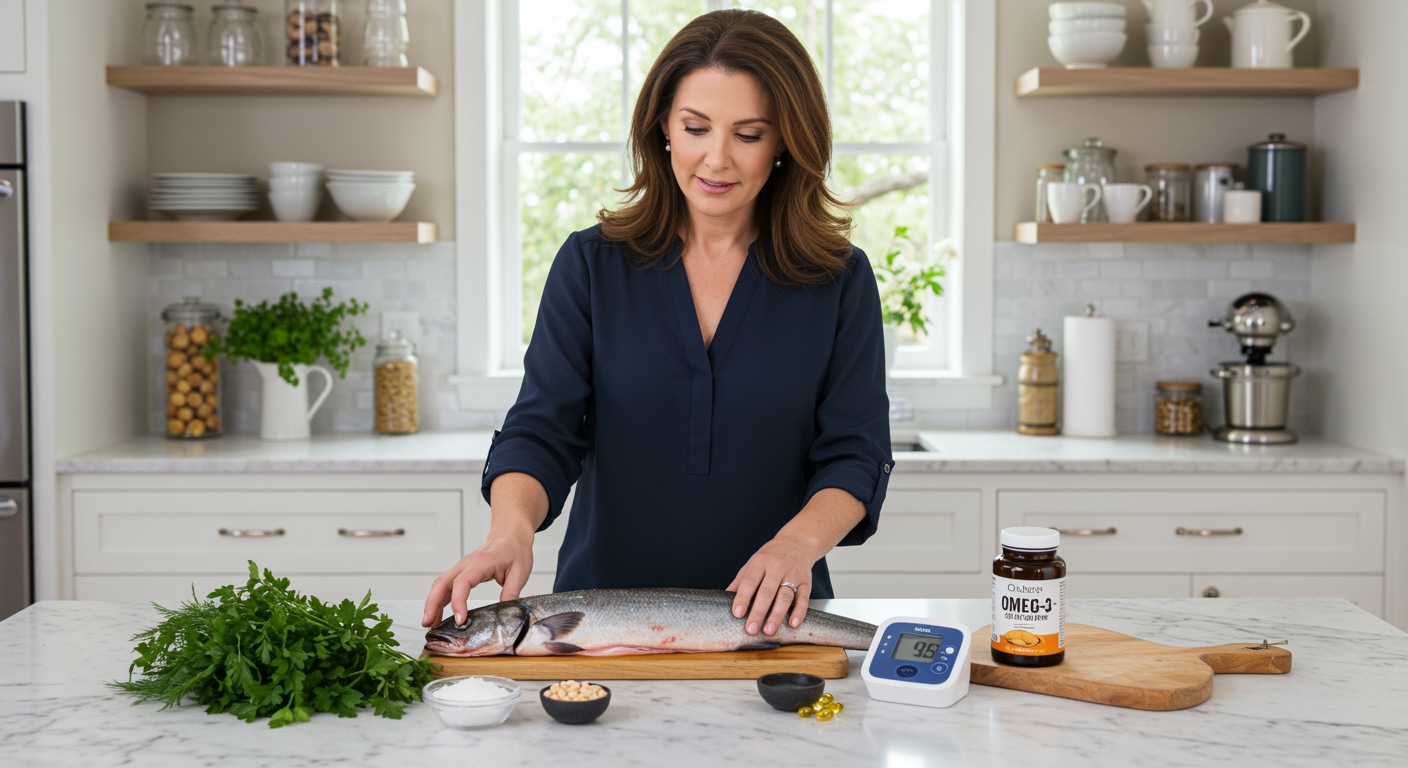✪ Key Takeaway: Eel contains omega-3 fatty acids and potassium that may help regulate blood pressure, but evidence remains limited.
Introduction
Your grandmother swears by eel soup for heart health, but your doctor never discussed this slippery fish during your last blood pressure checkup.
You might be wondering if eating eel can actually help stabilize your blood pressure because traditional medicine has long praised this unusual protein source for cardiovascular benefits.
Hi, I’m Abdur, your nutrition coach and today I’m going to explain whether eel truly helps regulate blood pressure and what science tells us about this ancient food remedy.
What Makes Eel Special for Blood Pressure?
Eel stands out from other fish because of its unique nutritional profile that directly impacts cardiovascular health.
This elongated fish contains exceptionally high levels of omega-3 fatty acids, particularly EPA and DHA, which are known to support healthy blood vessel function.
The potassium content in eel is also remarkable, providing about 272 milligrams per 100 grams of cooked flesh.
Potassium works as a natural vasodilator, helping your blood vessels relax and reducing the pressure against arterial walls.
Eel also contains significant amounts of magnesium, another mineral that plays a crucial role in maintaining healthy blood pressure levels.
The combination of these nutrients creates a synergistic effect that may benefit people struggling with blood pressure irregularities.
✪ Fact: Eel contains more omega-3 fatty acids than most commonly consumed fish like salmon or tuna.
How Does Eel Affect Your Cardiovascular System?
When you eat eel, the omega-3 fatty acids get absorbed into your bloodstream and begin working on multiple cardiovascular pathways.
These healthy fats help reduce inflammation in your blood vessels, which is often a hidden contributor to elevated blood pressure.
The EPA and DHA in eel also support the production of nitric oxide, a compound that signals your blood vessels to relax and widen.
This vasodilation effect directly reduces the resistance your heart faces when pump blood throughout your body.
Additionally, the protein quality in eel provides amino acids that support healthy endothelial function, which is the internal lining of your blood vessels.
Research suggests that regular consumption of omega-3 rich fish like eel may help maintain arterial elasticity as you age.
The magnesium content works alongside calcium to regulate muscle contraction in your heart and blood vessel walls.
✪ Pro Tip: Eat eel with vegetables high in vitamin C to enhance the absorption of its iron content.
What Does Research Say About Eel and Blood Pressure?
Scientific studies on eel specifically are limited, but research on similar omega-3 rich fish provides valuable insights.
A comprehensive analysis of fish consumption and cardiovascular health shows that people who eat omega-3 rich fish regularly have lower blood pressure readings on average.
Studies indicate that consuming 1-2 grams of EPA and DHA daily can reduce systolic blood pressure by 2-4 mmHg in people with elevated readings.
The potassium content in eel aligns with research showing that increased potassium intake helps counteract the blood pressure raising effects of sodium.
Traditional medicine systems in Asia have documented eel consumption for cardiovascular health for centuries, though this represents observational rather than controlled clinical evidence.
Some animal studies suggest that eel extract may have mild hypotensive effects, but human trials are needed to confirm these findings.
✪ Note: Most eel research focus on its nutritional composition rather than specific health outcomes.
Are There Any Risks or Considerations?
Eel consumption comes with several important safety considerations that you need to understand before adding it to your diet.
Raw or undercooked eel contains toxins that can cause serious illness, so proper cooking is absolutely essential for safe consumption.
Many eel species are high in mercury content, which can be problematic if you eat large quantities regularly.
Pregnant women and children should limit eel consumption due to potential mercury exposure risks.
The sodium content in prepared eel dishes, especially those with sauces or marinades, can actually counteract blood pressure benefits.
Some people may experience allergic reactions to eel, particularly those with existing fish or seafood sensitivities.
Environmental concerns about eel populations mean that sustainable sourcing is important for ecological responsibility.
✪ Pro Tip: Choose farm-raised eel from reputable sources to minimize mercury exposure while supporting sustainable practices.
How Should You Include Eel in Your Diet?
If you decide to try eel for potential blood pressure benefits, moderation and proper preparation are key.
Start with small portions, about 3-4 ounces once or twice per week, to gauge your body’s response.
Choose grilled or steamed eel preparations rather than fried versions to maximize health benefits.
Avoid heavily sauced eel dishes that add excess sodium, sugar, or unhealthy fats to your meal.
Pair eel with potassium-rich vegetables like spinach, broccoli, or sweet potatoes to enhance the blood pressure supporting effects.
Consider eel as part of a broader heart-healthy eating pattern rather than a standalone solution for blood pressure management.
Monitor your blood pressure regularly if you’re using dietary changes as part of your cardiovascular health strategy.
✪ Note: Always consult your healthcare provider before making significant dietary changes for blood pressure management.
The Bottom Line
Eel contains nutrients that may support healthy blood pressure, but it should not replace proven medical treatments or lifestyle interventions.
Food is medicine, but medicine is not always just food – eel can be part of a heart-healthy diet, but comprehensive blood pressure management requires multiple approaches.
I would love to hear about your experiences with eel or any questions you might have about incorporating unusual foods into a blood pressure friendly diet – please share your thoughts in the comments below.
References
At NutritionCrown, we use quality and credible sources to ensure our content is accurate and trustworthy. Below are the sources referenced in creating this article:
- PMC: Nutritional and Health Benefits of Marine Fish
- Journal of Clinical Hypertension: Fish Consumption and Blood Pressure
- Zoological Science: Ambient Temperature Regulates Drinking and Arterial Pressure in Eels
- PMC: Omega-3 Fatty Acids and Cardiovascular Health





